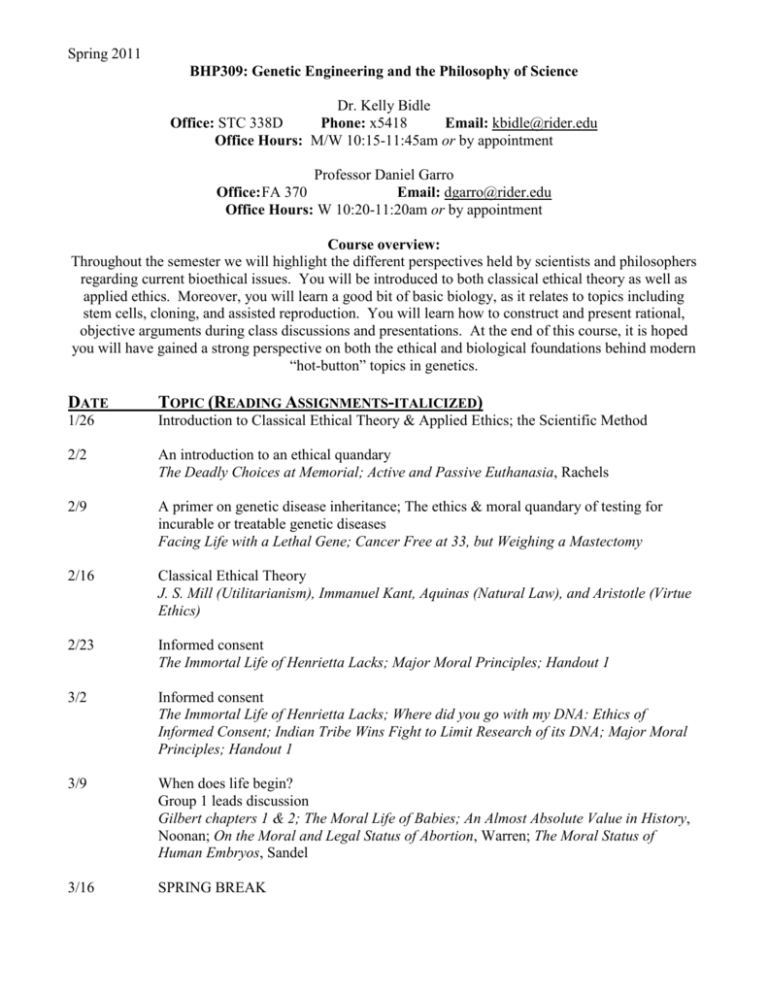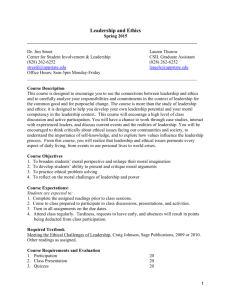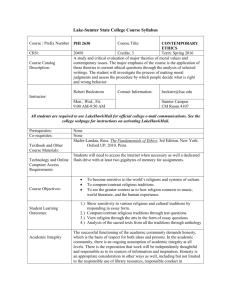Genetic Engineering and the Philosophy of Science
advertisement

Spring 2011 BHP309: Genetic Engineering and the Philosophy of Science Dr. Kelly Bidle Office: STC 338D Phone: x5418 Email: kbidle@rider.edu Office Hours: M/W 10:15-11:45am or by appointment Professor Daniel Garro Office: FA 370 Email: dgarro@rider.edu Office Hours: W 10:20-11:20am or by appointment Course overview: Throughout the semester we will highlight the different perspectives held by scientists and philosophers regarding current bioethical issues. You will be introduced to both classical ethical theory as well as applied ethics. Moreover, you will learn a good bit of basic biology, as it relates to topics including stem cells, cloning, and assisted reproduction. You will learn how to construct and present rational, objective arguments during class discussions and presentations. At the end of this course, it is hoped you will have gained a strong perspective on both the ethical and biological foundations behind modern “hot-button” topics in genetics. DATE TOPIC (READING ASSIGNMENTS-ITALICIZED) 1/26 Introduction to Classical Ethical Theory & Applied Ethics; the Scientific Method 2/2 An introduction to an ethical quandary The Deadly Choices at Memorial; Active and Passive Euthanasia, Rachels 2/9 A primer on genetic disease inheritance; The ethics & moral quandary of testing for incurable or treatable genetic diseases Facing Life with a Lethal Gene; Cancer Free at 33, but Weighing a Mastectomy 2/16 Classical Ethical Theory J. S. Mill (Utilitarianism), Immanuel Kant, Aquinas (Natural Law), and Aristotle (Virtue Ethics) 2/23 Informed consent The Immortal Life of Henrietta Lacks; Major Moral Principles; Handout 1 3/2 Informed consent The Immortal Life of Henrietta Lacks; Where did you go with my DNA: Ethics of Informed Consent; Indian Tribe Wins Fight to Limit Research of its DNA; Major Moral Principles; Handout 1 3/9 When does life begin? Group 1 leads discussion Gilbert chapters 1 & 2; The Moral Life of Babies; An Almost Absolute Value in History, Noonan; On the Moral and Legal Status of Abortion, Warren; The Moral Status of Human Embryos, Sandel 3/16 SPRING BREAK Spring 2011 DATE TOPIC (READING ASSIGNMENTS-ITALICIZED) 3/23 Assisted reproductive technologies: In vitro fertilization Group 2 leads discussion Gilbert chapters 3 & 4; Couples Cull Embryos to Halt Heritage of Cancer; Grievous Choice on Path to Parenthood; The Gift of Life, and its Price; Instruction on Respect for Human Life and its Origin; A Philosopher Looks at Assisted Reproduction, Steinbock 3/30 Assisted reproductive technologies: Surrogacy Group 3 leads discussion Meet the Twiblings; Much has Changed in Surrogate Pregnancies; Her Body, My Baby; Surrogate Mothers’ New Niche: Bearing Babies for Gay Couples; A Philosopher Looks at Assisted Reproduction, Steinbock; Handout 2 4/6 Genome therapy & genetic engineering Group 4 leads discussion Gilbert chapters 11 & 12; Firm Brings Gene Tests to the Masses; Gene Map Becomes a Luxury Item; Insurance Fears Lead Many to Shun DNA Tests; Congress Passes Bill to Bar Bias Based on Genes; Genetic Dilemmas and the Child’s Right to an Open Future, Davis; Beyond Consent: Ethical and Social Issues in Genetic Testing, Burgess; The Human Genome and Our View of Ourselves, Pääbo 4/13 Organ donation Group 5 leads discussion Gilbert chapter 9; Arizona Cuts Funding for Transplant Patients; A Gift of “Life” with Money Attached; Handout 3 4/20 Clinical trials Group 6 leads discussion New Drug Stirs Debate on Rules of Clinical Trials; excerpts from The Body Hunters; Handout 4 4/27 TBD ASSIGNMENTS Group paper Group discussion leading Term paper In-class group work position paper GRADING (NO CURVE) 94-100 = A 90-93 = A77-79 = C+ 73-76 = C 87-89 = B+ 70-72 = C- % OF TOTAL GRADE 15% 10% 25% 50% (10% each, lowest grade dropped of 6) 83-86 = B 60-69 = D 80-82 = B< 60 = F TEXTBOOKS Required: Bioethics and the new embryology, Gilbert, Tyler, and Zackin Recommended: 1) The Stanford Encyclopedia of Philosophy is a free online encyclopedia of philosophy that may be used as a secondary-source for this course: http://plato.stanford.edu/, and 2) Strunk and White. The Elements of Style. Longman, 2000. Spring 2011 CLASS POLICIES Attendance is required and will be taken each class. More than one unexcused absence will automatically result in your final grade being dropped by a half a letter grade (i.e., B dropped to a B-). Participation in class discussions is strongly encouraged. Please turn off all cellphones before coming to class. READING LIST For this class, we have attempted to compile a list of readings that reflect both the perspective of the well- informed layperson, as well as the academic expert. While you may not be required to read all of these articles, we expect you to use those you don’t read as reference for both group work as well as your term paper. All of the required readings are posted on Blackboard by week. Further, you can visit the following Diigo website (http://www.diigo.com/user/kbidle5?tab=0), to find a wealth of other articles revolving around many of the topics we discuss. Simply click on the tags “Ethics” “ART” or “Genome” to read further on these topics. The majority of articles you will read for the Layperson Perspective come from the New York Times. If you have trouble accessing the article, simply type the title into a search box on the NYTimes website (www.nytimes.com). UNIVERSITY POLICIES EMAIL: Your Rider email account is your email address for all official email communications from the University. You are expected to check your Rider email account on a frequent and consistent basis in order to stay current with university-related communications. Any email from us about this course will only be sent to your official Rider email address. Any communication from you to us must come from your Rider email address. PLAGIARISM: Academic dishonesty includes any unauthorized collaboration or misrepresentation in the submission of academic work. In all written work, whether in class or out of class, the student’s name on the work is considered to be a statement that the work is his or hers alone, except as otherwise indicated. Students are expected to provide proper citations for the statements and ideas of others whether submitted word for word or paraphrased. Failure to provide proper citations will be considered plagiarism and offenders will be subject to the charge of plagiarism specified in the statement of regulations. Similarly, students are expected to adhere to all regulations pertaining to examination conduct. These regulations are designed to insure that the work submitted by the student on examinations is an honest representation of that student’s effort and that it does not involve unauthorized collaboration, unauthorized use of notes during the exam or unauthorized access to prior information about the examination. CODE OF ACADEMIC CONDUCT: Rider University expects students to strictly adhere to the Code of Academic Conduct (The Source p10-12). The Code prohibits all forms of academic dishonesty including: cheating on exams or knowingly assisting another student to do so, plagiarizing papers, submitting the same paper for credit in two courses without authorization, buying papers, submitting fraudulent documents, and forging signatures. ACCOMMODATIONS FOR STUDENTS WITH DISABILITIES: Documented disabilities, interferes with ability to meet requirements of academic course Documentation must come from appropriate University official: Please inform us of your needs at the beginning of the semester To learn more, please visit: http://www.rider.edu/2526_2686.htm








